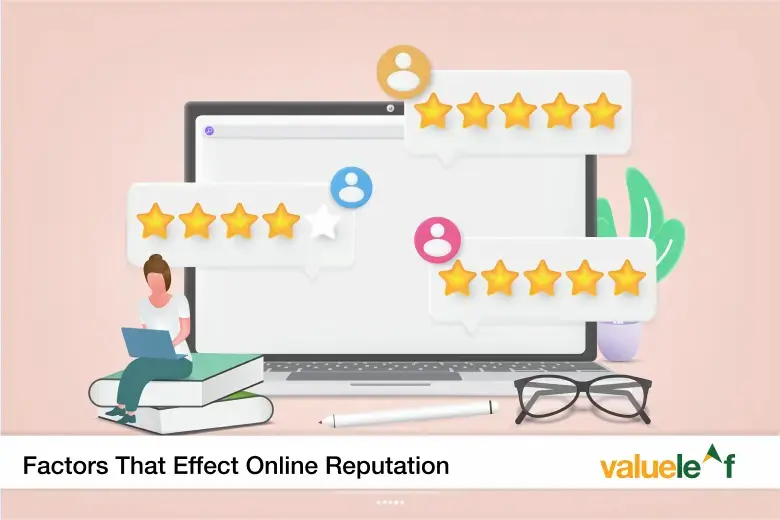In a digital-first world, your online reputation can be your strongest asset or your biggest liability. Whether you’re a business, personal brand, or professional, what people find about you online influences their trust, purchasing decisions, and willingness to engage.
A 2023 study revealed that 91% of consumers read online reviews before making a purchase, and 70% will not engage with a business if they find negative feedback. That’s why managing your online presence is more important than ever.
In this post, we’ll break down the 9 most critical factors that directly shape your online reputation — and how you can take control.
1. Online Reviews and Ratings
Online reviews are the digital word-of-mouth. Sites like Google, Yelp, Trustpilot and even Amazon hold tremendous power over consumer perception.
- Positive reviews build trust and drive conversions.
- Negative reviews, especially when unanswered, damage credibility.
Pro Tip: Always respond to reviews — especially the negative ones — with professionalism and empathy. A thoughtful reply can turn a critic into a loyal customer.
2. Google Search Results
Your first impression happens on Google, not in person. What shows up when someone searches your name or brand?
- Positive articles, press mentions, and your website help build authority.
- Negative results or outdated listings can mislead and harm perception.
Action Step: Regularly Google your brand and use SEO techniques to push positive content higher in the search rankings.
3. Social Media Presence
Your social profiles are more than communication channels — they’re public extensions of your brand.
- Inconsistent posting, unprofessional tone, or viral mishaps can damage your image.
- Engaging, value-driven content builds community and trust.
Pro Tip: Monitor mentions, respond to comments, and stay on-brand across platforms like LinkedIn, Instagram, Twitter/X, and Facebook.
4. Media Coverage and PR Mentions
Press — whether paid or earned — influences public perception. A positive news article can validate your brand, while a negative headline can go viral quickly.
- Keep track of your media mentions using Google Alerts.
- Use PR to shape your narrative — don’t wait for a crisis to define it.
Pro Tip: Reach out to local journalists, bloggers, and influencers to earn positive, reputation-boosting coverage.
5. Website and Blog Content
Your website is often the most trusted source about you. If it’s outdated, slow, or lacks credibility signals, visitors may form a poor impression.
- Regular blog updates show authority and commitment to your industry.
- Thought leadership content (guides, case studies) positions you as an expert.
Action Step: Optimize for mobile, ensure fast load speeds, and keep branding consistent.
6. Online Listings and Directories
Directory listings (Google Business, Yelp, Bing Places, etc.) must be accurate and consistent. Small errors in your name, address, or phone (NAP) can hurt SEO and credibility.
Quick Fix: Audit your listings regularly and use tools like Moz Local or Yext to manage them efficiently.
7. Customer Service Interactions
Support conversations — especially public ones on Twitter/X, Instagram, or Facebook — play a major role in shaping your reputation.
- Fast, helpful responses show professionalism.
- Public disputes or ignored complaints reflect poorly.
Pro Tip: Train your support team to respond kindly, even under pressure, and escalate issues when needed.
8. Employee and Team Behavior Online
Your team members represent your brand. If employees have public social media profiles, their actions online can reflect back on the company.
- LinkedIn, in particular, can influence how partners and clients perceive your brand.
- Public controversies tied to team members can quickly escalate.
Action Step: Offer social media policy guidelines and educate employees on representing your brand safety ethically and professionally.
9. Crisis Management and Response Time
When a crisis hits — whether it’s a negative review, a data breach, or a PR issue — your response time and tone are everything.
- Silence or denial often worsens the damage.
- Transparency, empathy, and swift action protect your reputation.
Pro Tip: Have a digital crisis management plan in place before anything goes wrong.
Conclusion
Your online reputation is a living, evolving entity that spans multiple channels — reviews, content, media, employees, and more. The good news? You can control most of it. By paying close attention to these 9 factors and taking proactive steps, you can build trust, increase credibility and protect your brand in an increasingly connected world.
FAQs
- What is online reputation management (ORM)?
Online Reputation Management (ORM) is the practice of monitoring, influencing, and improving how your brand, business, or personal name appears online — across search results, social media, reviews, and other platforms. - How often should I check my online reputation?
You should monitor your online reputation at least weekly. Set up Google Alerts and use monitoring tools like Mention or Brand24 to stay updated in real-time. - Can a few bad reviews ruin my online reputation?
One or two negative reviews won’t ruin your reputation if you have a strong base of positive feedback. However, ignoring negative reviews can magnify their impact. Always respond professionally and seek to resolve issues. - How do I push down negative search results on Google?
You can publish high-quality content (blogs, news articles, social media posts) optimized for your brand name. SEO strategies help positive or neutral content rank higher, pushing negative results lower. - What’s the most effective platform for improving online reputation?
It depends on your audience. For B2C businesses, platforms like Google Reviews, Instagram, and Facebook are key. For B2B companies and professionals, LinkedIn and Google Search reputation matter more. - Should small businesses invest in professional reputation management?
Yes — even small brands benefit from good reputation practices. Investing early can save major repair costs later, especially during unforeseen crises. - How important is crisis management in protecting online reputation?
Extremely important. A slow or poorly handled crisis can severely damage trust. Having a crisis plan ensures you respond quickly, transparently, and with empathy — minimizing long-term harm. - How can employee actions impact my brand’s reputation?
Employees’ public online behavior — especially on LinkedIn, Twitter/X, and Instagram — can reflect back on your brand, both positively and negatively. It’s important to educate teams on professional conduct online. - What tools can help manage my online reputation?
Tools like Google Alerts, SEMrush, BrandYourself, Mention, and Moz Local can help you monitor mentions, reviews, SEO rankings, and directory listings effectively.




